Can goats eat cat food? It’s a question that piqued my curiosity one day as I watched my mischievous goats nibble at the stray cat food that had fallen onto the barn floor. If you’re a fellow goat owner or just a curious animal enthusiast, you’ve likely pondered over such unconventional dietary combinations too.
From firsthand experience, goats seem willing to try almost anything, and cat food is no exception. However, the more important query is: should they eat it? To answer: while a stray nibble here and there might not harm them, cat food isn’t suitable as a regular diet for our caprine friends.
In this article, we’ll delve deeper into the dietary needs of goats, the composition of cat food, and the potential risks of blending these two seemingly unconnected worlds. Whether you’re trying to satiate a goat’s curious palate or merely exploring out of curiosity, let’s embark on this educational journey together.
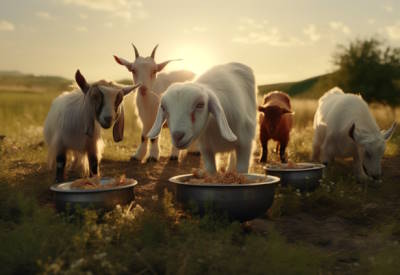
Understanding Goat Dietary Needs
Goats, with their curious nature, have been known to munch on just about anything that comes their way. But what really suits their dietary needs? Let’s delve into the world of goat nutrition.
Natural Diet of Goats
In their natural habitat, goats are browsers rather than grazers. This means they prefer shrubs, weeds, and trees over plain grass. They love variety and tend to pick and choose among different plants, getting a mix of flavors and nutrients.
Essential Nutrients for Goats
Like all animals, goats have certain nutritional requirements. They need a good balance of vitamins, minerals, carbohydrates, proteins, and fats. Calcium, phosphorus, potassium, and salt are some of the minerals that are essential for their well-being.
How Their Digestive System Works
Goats are ruminants, which means they have a four-chambered stomach. Each chamber has a role in breaking down and digesting the complex foods they eat. Their digestion process is what allows them to consume a variety of plants that other animals might find indigestible.
[GoatAffiliate]
A Glimpse Into Cat Food Composition
Now, shifting gears, let’s discuss what cat food is made of. Cats are obligate carnivores, so their food is tailored quite differently from what a goat might naturally eat.
Primary Ingredients of Cat Food
Most cat foods list a type of meat or meat byproduct as the primary ingredient. This is followed by grains or vegetables, some fats, and possibly some filler ingredients. It’s a protein-rich diet, reflecting the meat-eating nature of felines.
Nutritional Profile of Cat Food
A quick glance at a cat food label will show high protein content, moderate fats, and lower carbohydrates. It may also have added taurine, an essential amino acid for cats, and other cat-specific nutrients.
Additives and Preservatives in Cat Food
To extend shelf life and enhance flavor, some cat foods may contain additives and preservatives. While these might be harmless or even beneficial for cats, they might not necessarily sit well with a goat’s digestive system.
Potential Risks of Feeding Goats Cat Food
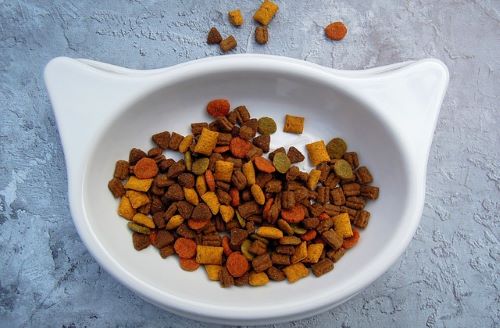
Dabbling in the unusual, have you ever considered feeding cat food to goats? Before you do, here are some potential pitfalls to keep in mind.
Mismatch of Nutrient Ratios
While cats thrive on a high-protein diet, goats need a more balanced mix. Relying on cat food can lead to nutrient imbalances in goats, potentially causing health issues down the road.
Presence of Harmful Additives
As mentioned earlier, cat food might contain certain additives or preservatives that aren’t suitable for goats. What’s beneficial for one animal can sometimes be detrimental for another.
The Risk of Overfeeding
There’s also the risk of overfeeding. Cat food, being dense in nutrients, might seem like a tiny snack but can quickly add up in terms of caloric intake.
Comparing Goat Feed to Cat Food
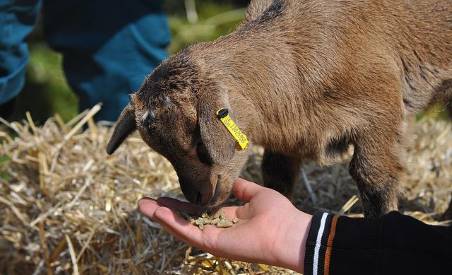
When it comes to understanding the nutritional needs of animals, one of the most effective approaches is to make direct comparisons. In this case, comparing the composition and benefits of goat feed with cat food offers a clearer perspective on what each animal requires for optimal health. Let’s break down these feeds side by side to see where they align and where they differ.
Ingredients and Primary Composition
Goat feed is formulated with the ruminant digestive system in mind. It mainly comprises:
- Grains: Often barley, oats, or corn.
- Grasses: Alfalfa or timothy hay is common.
- Vitamins & Minerals: Essential for bone health, metabolic function, and overall well-being.
On the other hand, cat food is tailored for obligate carnivores. Thus, its primary components are:
- Meats: Chicken, beef, fish, or other meats are usually at the forefront.
- Grains or Carbohydrates: These can vary but might include rice, wheat, or corn.
- Fats: Essential for energy and the overall health of the cat.
Nutritional Profiles and Their Impacts
While there might be grains present in both feeds, the nutritional emphasis is drastically different.
Goat feed:
- Higher Fiber: Aids in digestion and is essential for ruminants.
- Balanced Protein: Not as high as in cat food, but tailored for muscle maintenance and growth.
- Essential Minerals: Especially vital are calcium and phosphorus for goats, given their propensity for bone growth (think horns and skeletal structure).
Cat food:
- High Protein: Cats require a significant amount of protein for their muscle health and overall energy.
- Taurine: An amino acid that’s crucial for cats but not necessarily present in goat feeds.
- Lower Fiber: Cats don’t require as much fiber as ruminants.
Cost Implications: Which is More Economical?
The notion of substituting goat feed with cat food might arise from the idea of cutting costs. But when we evaluate the price point, cat food, especially premium brands, can be substantially pricier per pound.
Goat feed, produced in bulk and tailored for larger animals, often comes out to be more cost-effective in the long run. It’s also worth noting that the potential health risks or vet bills from feeding goats an improper diet would far outweigh any initial savings.
Adaptability and Dietary Tolerance
Goats are known for their curious and adaptable eating habits, often sampling a variety of foods. Cats, being more specialized eaters, have a narrower range of dietary tolerance. While a goat might nibble on cat food out of curiosity, it’s essential to understand that its digestive system is best suited for its natural diet, and the same goes for cats.
Real-Life Experiences: Goat Owners and Cat Food
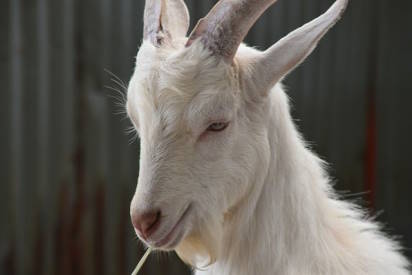
Let’s chat about what some goat owners have experienced when they’ve let their goats have a taste of cat food.
Occasional Treat or Snack?
Some goat owners have mentioned that their goats got into the cat food and seemed to enjoy it. It can be an occasional treat, but it’s not something you’d want to make a habit of.
Observations from Goat Owners
While some goats might enjoy the taste, others could have digestive upsets. Remember, just because they eat it doesn’t mean it’s good for them.
Precautions to Take if Trying
If you do decide to let your goat sample some cat food, make sure it’s a tiny amount. Observe them closely for any signs of distress or discomfort.
Alternatives to Cat Food for Goats
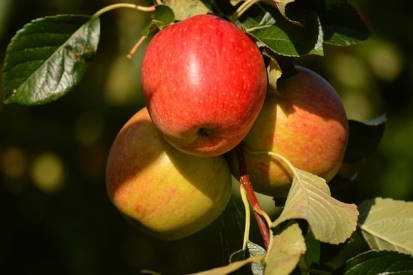
If you’re looking to spice up your goat’s diet, there are safer and healthier options than cat food.
Healthy Snack Options for Goats
Fruits and vegetables can be great treats for goats. Apples, carrots, and leafy greens are among their favorites. Just make sure to feed in moderation and avoid any toxic foods.
Creating Homemade Goat Treats
You can mix grains, molasses, and some fruits to create tasty treats for goats. There are plenty of recipes online tailored to goat preferences.
Importance of Fresh Water and Forage
No matter what treats you offer, always ensure that your goats have access to fresh water and their regular forage. A balanced diet is key to their health and happiness.
What Other Animal Feeds Can Goats Eat Apart from Cat Food?
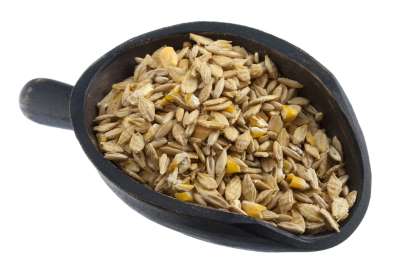
We’ve delved into the cat food question, but what about other animal feeds? Can a goat munch on a variety of feeds designed for different animals? With barnyards often housing an array of creatures, it’s crucial to understand which feed swaps are safe and which ones we should avoid. Let’s break down five common animal feeds to see if they make the cut for our caprine friends.
Chicken Feed
At first glance, chicken feed might seem harmless. It’s grain-based, after all. However, it’s tailored for birds and contains a different nutrient balance than goats require. Additionally, some chicken feeds contain medications or additives for poultry health that may not be suitable for goats.
In small amounts, it might not be immediately harmful, but it’s best not to make it a regular part of a goat’s diet.
Read More: Can Goats Eat Chicken Feed: Why It’s Not A Good Idea
Dog Food
Dog food, like cat food, is designed for carnivores. Even if you opt for a brand with a significant grain content, it’s still rich in proteins and fats that exceed what goats typically need.
Moreover, some dog foods might contain additives or ingredients that could upset a goat’s stomach. As a rule of thumb, keep the kibble in the dog bowl and out of the goat pen.
Read More: Can Goats Eat Dog Food: Why It’s Not A Good Idea
Horse Feed
Horse feed and goat feed share some similarities since both animals are herbivores. However, there are differences. Horses, being much larger, often have feeds that are calorie-dense.
While it might not be as risky as some of the other feeds on this list, it’s still essential to ensure that any horse feed consumed by goats doesn’t lead to overeating or weight gain. It’s a safer bet, but moderation is key.
Read More: Can Goats Eat Horse Feed? Simple Answer & Feeding Tips
Rabbit Food
Rabbits and goats both love their greens, but rabbit pellets are another story. These are often formulated with a high fiber content suitable for the rabbit’s digestive system.
While fiber is good for goats, some rabbit feeds might contain additives or nutrients at levels not optimal for goats. An occasional nibble might not be a problem, but it’s best not to make it a regular dietary item.
Read More: Can Goats Eat Rabbit Food? Simple Answer & Feeding Tips
Sheep Feed
Now, this is where things get interesting. Goats and sheep share many similarities in terms of dietary needs. Many times, their feeds can be quite interchangeable. However, it’s essential to note that some sheep feeds might contain additives to prevent copper poisoning in sheep.
Goats, on the other hand, require a certain level of copper in their diet. Always check the label and consult with a veterinarian if you’re considering this switch.
Can goats eat cat food – final thoughts
So, can goats eat cat food? Well, in the grand buffet of life, goats have the enthusiasm to sample just about anything, including that crunchy cat kibble. But as we’ve discovered, just because they can doesn’t mean they should. Our journey took us through the intricacies of goat nutrition, the protein-packed world of cat food, and the potential misadventures of mixing the two.
In the end, it’s all about balance and understanding the unique needs of each animal. Despite both being lovable members of our households, goats and cats have vastly different dietary roadmaps. So, next time you catch Mr. Goat sneaking a nibble from Miss Kitty’s bowl, remember our exploration today and gently steer him back to his own nutritious spread. Because, after all, everyone deserves a meal tailored just for them!
Related Articles:
